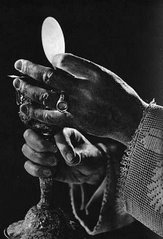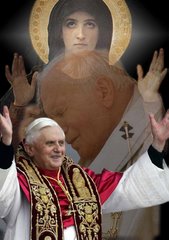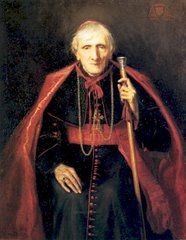From Parousian alumnus and Houma-Thibodaux seminarian Stephen Dufrene:
The following is a dialogue between a mature, or enlightened, pro-wrestling fan and a “rasslin” fan. The purpose of the dialogue is to demonstrate Plato’s belief in the necessity to postulate forms and their existence in what we perceive to be reality, as well as what they (forms) must be according to the conclusions of the dialogue. In the second part of the dialogue, a third character is introduced to articulate Aristotle’s critique as well as offer his own solution to the question of what is and what is known in reality.
SCENE I: The scene takes place during the intermission of a live pro-wrestling show. Eddie, the “rasslin’” fan, never misses pro-wrestling on TV and perceives what is shown as reality. Eddie has a seat next to a mature fan named Joe, who is also a fan of Plato. The dialogue begins as Eddie is visibly upset after hearing an announcement concerning his favorite wrestler, Rubberman, being attacked and injured backstage. Joe knows better than to burst the blistering excitement of Eddie’s ignorance; however, Joe has taken advantage of the drink specials, gets emotional when he drinks, and is having trouble watching Eddie’s tears.
J: C’mon man, you know he’s not really hurt back there!
E: Didn’t you just hear the emergency announcement?
J: (laughing) Sure I did, but that doesn’t mean Rubberman is actually hurt.
E: You’re right; he does have special powers, and maybe he has already healed himself. I saw him flying on TV last week, you know.
J: You have got to be kidding me!
E: Nope, saw it with my own two eyes, and they don’t lie.
J: I think you’re missing the point; all of what happens to the wrestlers is staged. (Eddie is becoming visibly angry at this point despite the sorrow still felt for Rubberman.)
J: Let’s make a deal: listen to what I’ve got to say, and you will feel better about your friend Rubberman.
E: Anything to take away this anguish!
J: Then let us begin. Do you recall the first match tonight when we could hear the wrestlers communicating what moves they were about to perform? The opponents openly communicated with one another before every major slam and flip.
E: You mean that’s what they were doing? I thought they were threatening one another. I’m not sure if I want to believe you.
J: You see, the camera men are trained so that what is caught on tape does not show any communication between the wrestlers. The result is that what we see on television is perceived differently from what actually is physically taking place in the ring.
E: Are you telling me that there is more than what I see on TV?
J: Your eyes don’t lie, right? What we see on TV is simply what the cameras want to show us, vague images of the changing physical matter taking place in the ring.
E: So everything that I have believed from pro-wrestling on TV is nothing more than weak ideas of what is reality; and the characters only image what the reality actually is?
J: You’re exactly right; these were only weak ideas based on incomplete information from TV. Sense experience cannot explain everything. Feeling better about Rubberman now?
E: A little. I’m starting to believe that there is more going on than what I can see, but how can I know for sure?
J: You have to recognize that there is a difference between your sense experience and intellect. Can you think of anything that you know to be different from someone else’s perceptions?
E: Today my supervisor, Al, and I drank some beer at lunch. Shortly after we returned to work his boss passed by, and Al loudly reminded me never to drink during the workday. His boss just turned and commented on how proud he was with Al’s positive influence. Al’s boss has no idea of what the reality actually is. Are you saying…
J: Exactly, this type of definition that is outside of the material changing world can serve as a sort of “common denominator” between your knowledge of what actually goes on at work and what actually happens in pro-wrestling. You see, just as your supervisor only acts the way he should when his boss is around, we can say that he only imitates what the ideal employee would be.
E: I see! Do you mean that the wrestlers only participate and imitate the ideal wrestlers they represent? What is this ideal? I think you’ve had too many beers; you and Al should hang out!
J: Now you’re on the right track, you’re beginning to see through the realm of opinion and into the realm of knowledge. We can now move into the knowledge of stability outside the changing material world, or for our sake, what goes on inside the ring. The following might be painful to hear, but give me a chance; we must try to separate the intellect from the senses. There is a promoter who devises the story lines and outcomes for all of the matches. The promoter’s imagination is the reality behind the appearances and is outside of the material changing world of what you once perceived to be the reality inside of the ring. The wrestlers only participate in and imitate what goes on in the promoters imagination, or, in philosophical terms, what would be the form.
E: So the wise fan recognizes the unchanging reality behind what the senses perceive to be reality inside the ring. The promoter is the reason that all things in the ring exist!
J: Yes, We can now describe him as the Good, or what it is that gives proper order to what is perceived as reality.
E: Ahhh….so everything starts with the promoter, or the Good. What goes on in his imagination explains my questions of what is, what is known, and what is the cause of what happens in the material changing world of the ring. You called the promoter’s imagination the “form”; does everything else in the world have a form they only imitate or participate in?
J: I believe so. Let’s investigate by summarizing what we have learned. We know in order for forms to exist they must be similar to the promoter’s imagination, immaterial and outside of the changing world.
E: Right, they must also be completely independent of my beliefs, since I believe there is no way the midget in the last match could really beat the 500lb. man!
J: Let’s also recall the masked wrestler from earlier. On TV last week he was 40 pounds heavier and had a tattoo; I don’t believe he lost all that weight and rubbed off a tattoo!
E: That’s right, there must be an unchanging reality outside of what is perceived through the senses. What can we learn from the instances when there is an accident and the referee stops the match? This is definitely not what is in the mind of the promoter.
J: Then we would have to agree that there is an ideal essence that the wrestlers only participate in.
[At this point Eddie leaves his seat to buy a Rubberman foam finger. On his way he sees Rubberman who is obviously not injured. Eddie runs to tell Joe the news.]
E: Joe, I just saw Rubberman, and he is OK! Now I understand that he was only injured backstage in the promoters mind. Rubberman is not imitating the form very well!
SCENE II: Doug, a former wrestler, is sitting behind Joe and Eddie. Doug couldn’t help but hear the philosophical discussion transpiring before him. He had originally chosen to remain silent so as not to offend Joe and Eddie. This sentiment soon vanished when he realized he was going home empty handed- Eddie had bought the last Rubberman foam finger. Emotions are high.
D: Excuse me, but I couldn’t help but overhear your discussion. I’ve got to say that you guys have done nothing but complicate my life! What you speak of is a useless doubling of reality with no basis for explaining how the wrestlers themselves change over time!
E: Why don’t you explain yourself?
D: Lets start with the idea of the wrestlers only participating or imitating the promoter’s imagination. This may be a challenge to see from the fan’s perspective, but it is an absurd assumption. This can be proven wrong by the simple evidence of the promoter’s temper rising when wrestlers don’t perform the way his (the promoter’s) imagination had planned. Yes, you could say they were poorly imitating; however, I have seen several occurrences where wrestlers actually opposed what the promoter had imagined.
E: So the participation of wrestlers in the promoter’s imagination is what you mean as a useless doubling of reality! I knew Rubberman was more than an imitation!
D: Absolutely, Rubberman is the substance! He contains both matter in his body, and form in his understanding of how to behave, as well as what he is to accomplish during the match. If there were no man to give matter to the Rubberman character, then the character would cease to exist have form. Matter and form cannot be separated!
E: I think I now know why Joe’s explanation cannot explain change. Let me give it a shot. In the promoter’s mind the wrestler would always remain the ideal, but in reality the champion always ages and eventually becomes less than a crowd favorite. I agree, Doug; to say that material only imitates the form is not good enough.
J: I see where my example is weak, but how do you explain change?
D: Since form and matter exist in each wrestler, or what we can call the substance, it is the matter itself that changes, and the forms come and go.
E: Do you mean, for example, that as the wrestler portraying Hulk Hogan ages, his character changes into a wrestler who talks a lot more than wrestles?
D: Right. As the age (matter*) changes, different uses for the characters have to be imagined. In other words, as material changes, the form that once made up its substance leaves and another form enters. I think you would agree that as far as characters go, Hulk Hogan of old and Hollywood Hogan of today are based off completely different ideas, or as we have previously called them, forms.
E: Without a doubt, it’s only the same person portraying two different characters. Am I correct now in saying that, as the wrestler ages and his character is changed, the form making up his substance changes?
D: Correct, and therefore his substance also changes. Hence the progression of an individual wrestler and the different characters that he portrays. When the wrestler is young and healthy, most of his time is spent in the ring. As he ages and becomes injured his character is changed into a manager. Once he is unable to perform the duties of a manager, he is put out to pasture as an announcer. In each of these different phases the health and age (physical matter*) change, and the ideas that inspire the characters (forms) come and go accordingly with the health and age (matter*) of the wrestler.
E: If this is the explanation of how things change, I believe I can give an example of why things change along the lines of our wrestling discussion.
D&J: I’d like to hear this!
E: Let’s call the individual who wants to become a wrestler the material cause, or the “stuff”. The promoter and the wrestler himself develop an idea of what the ideal character would be, resulting in a formal cause.
D: Would the formal cause be the character’s personality, fighting style, muscular build, etc.?
E: Good job, Doug. Once the wrestler has an idea of the formal cause, he can begin to train and practice in order to become what has been envisioned. This training and practicing stage can be called the efficient cause. Items such as weights and acting classes may be considered agents.
D: What will we call the stage once the wrestler reaches his goal and does his best to fulfill what we called the formal cause?
E: Let’s call the attainment of the goal or purpose the final cause.
The scene ends as the announcer calls an end to the intermission. Joe, Eddie, and Doug laugh as they read the announcer’s shirt: “Everything that I know about reality, I’ve learned from Pro-Wrestling!”
* It is understood that Aristotle would categorize age and ability as accidents of the individuals that wrestle; however, here they pertain to the substance of the character. I.e., if you take away the flexibility of the wrestler portraying Rubberman, the character of Rubberman would cease to exist.
Monday, October 09, 2006
Subscribe to:
Post Comments (Atom)






No comments:
Post a Comment